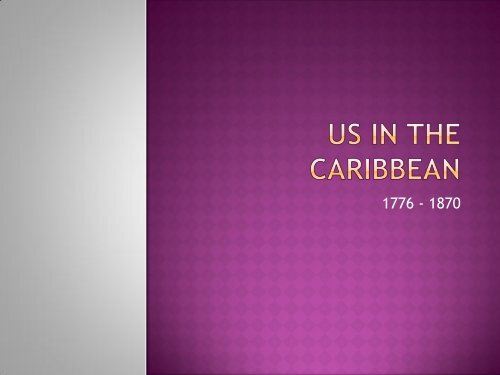US in the Caribbean
US in the Caribbean
US in the Caribbean
Create successful ePaper yourself
Turn your PDF publications into a flip-book with our unique Google optimized e-Paper software.
1776 - 1870
Watch <strong>the</strong> video<br />
Write a short (2 m<strong>in</strong>ute-)commentary on <strong>the</strong><br />
clip giv<strong>in</strong>g <strong>the</strong> reason stated by <strong>the</strong><br />
songwriter why Lat<strong>in</strong> Americans (and<br />
<strong>Caribbean</strong> people) often oppose <strong>US</strong><br />
<strong>in</strong>tervention.<br />
State whe<strong>the</strong>r you agree with his position.<br />
Tiburón (shark)<br />
lyrics
Remember <strong>the</strong> research questions. Which factors<br />
were most important <strong>in</strong> each <strong>US</strong> <strong>in</strong>tervention:<br />
economic, political (<strong>in</strong>clud<strong>in</strong>g strategic/defence)<br />
or ideological?<br />
Were <strong>the</strong> actions taken to do with:<br />
Defence<br />
Expansionism<br />
Trade and <strong>in</strong>vestments (economic factors)<br />
Ideology?<br />
Both of <strong>the</strong>se are<br />
political factors
Assess <strong>the</strong> reasons for <strong>US</strong> <strong>in</strong>terest <strong>in</strong> <strong>the</strong><br />
<strong>Caribbean</strong> 1776-1870<br />
Decide which of <strong>the</strong> follow<strong>in</strong>g factors were<br />
important:<br />
Defence<br />
Expansionism<br />
Trade and <strong>in</strong>vestments (economic factors)<br />
ideology
key events<br />
American Independence 1776<br />
Lat<strong>in</strong> American Independence.<br />
Monroe Doctr<strong>in</strong>e 1823<br />
Manifest Dest<strong>in</strong>y<br />
Desire for a canal<br />
Grow<strong>in</strong>g <strong>in</strong>terest <strong>in</strong> Cuba<br />
<strong>US</strong> economic expansion after Civil War
1776 to 1870<br />
Use for reference when review<strong>in</strong>g today’s<br />
work to help you understand <strong>the</strong> “whole<br />
picture” of this period.
American Independence 1776. ended trade<br />
relationship between two sets of colonies. <strong>US</strong> could<br />
not legally trade with <strong>the</strong> British <strong>Caribbean</strong>.<br />
Struggle with Brita<strong>in</strong> over markets <strong>in</strong> <strong>the</strong> <strong>Caribbean</strong><br />
and o<strong>the</strong>r issues. War of 1812-1814, free trade<br />
agreements 1830. Interest <strong>in</strong> <strong>Caribbean</strong> is ma<strong>in</strong>ly<br />
economic.<br />
Lat<strong>in</strong> American Independence. <strong>US</strong> concerns are<br />
economic (keep<strong>in</strong>g markets) and ideological<br />
(support<strong>in</strong>g <strong>in</strong>dependence of Lat<strong>in</strong> American<br />
Countries).
Simon Bolivar (1783-1830) was<br />
one of South America's<br />
greatest generals.<br />
His victories over <strong>the</strong><br />
Spaniards won <strong>in</strong>dependence<br />
for Bolivia, Panama,<br />
Colombia, Ecuador, Peru, and<br />
Venezuela.<br />
He is called El Liberator (The<br />
Liberator) and <strong>the</strong> "George<br />
Wash<strong>in</strong>gton of South America."<br />
http://www.bolivarmo.com/hi<br />
story.htm
Monroe Doctr<strong>in</strong>e 1823 said “Europe must not<br />
<strong>in</strong>tervene <strong>in</strong> Lat<strong>in</strong> America and <strong>the</strong> <strong>Caribbean</strong>”<br />
Video<br />
Writ<strong>in</strong>g exercise:
What was <strong>the</strong> ma<strong>in</strong> reason for <strong>the</strong><br />
declaration of <strong>the</strong> Monroe Doctr<strong>in</strong>e?<br />
Was this reason economic, political, strategic<br />
or ideological?<br />
How might it have affected <strong>the</strong> island<br />
territories of <strong>the</strong> <strong>Caribbean</strong>? Remember: <strong>in</strong><br />
1823 only Haiti and <strong>the</strong> Dom<strong>in</strong>ican Republic<br />
were <strong>in</strong>dependent.
Brita<strong>in</strong> did not accept <strong>the</strong> Monroe Doctr<strong>in</strong>e. Had<br />
own <strong>in</strong>terests <strong>in</strong> <strong>the</strong> <strong>Caribbean</strong>.<br />
Manifest Dest<strong>in</strong>y—(Mexican American war 1846)<br />
Ideology affect<strong>in</strong>g <strong>US</strong> attitude towards expansion.<br />
Rem<strong>in</strong>der<br />
Desire for a canal...
http://www.econedl<strong>in</strong>k.org/lessons/images_lessons/719_1914_panama_<br />
canal.GIF1.gif
Wrangl<strong>in</strong>g with Brita<strong>in</strong> over Central<br />
America (wanted a canal) Clayton-<br />
Bulwer Treaty 1850. Concerns are<br />
economic and strategic (political)
Assess <strong>the</strong> factors:<br />
Zachary Taylor’s secretary of state, John M. Clayton, met with a<br />
British representative, Sir Henry Bulwer, to calm a potentially<br />
troublesome issue <strong>in</strong> Central America. Both powers had studied<br />
<strong>the</strong> feasibility of construct<strong>in</strong>g a canal to l<strong>in</strong>k <strong>the</strong> Atlantic and<br />
Pacific oceans through <strong>the</strong> narrow isthmus <strong>in</strong> Central America.<br />
Initially <strong>the</strong> most promis<strong>in</strong>g site appeared to be <strong>in</strong> Nicaragua.<br />
Nei<strong>the</strong>r party was prepared <strong>in</strong> 1850 to undertake <strong>the</strong> massive<br />
project, but wanted to ensure that one country would not act <strong>in</strong><br />
<strong>the</strong> absence of <strong>the</strong> o<strong>the</strong>r.<br />
Under <strong>the</strong> terms of <strong>the</strong> Clayton-Bulwer Treaty, <strong>the</strong> two parties<br />
agreed:<br />
Not to seek exclusive control of <strong>the</strong> canal or territory on ei<strong>the</strong>r<br />
side of such a canal<br />
Not to fortify any position <strong>in</strong> <strong>the</strong> canal area<br />
Not to establish colonies <strong>in</strong> Central America<br />
http://www.u-s-history.com/pages/h344.html
Grow<strong>in</strong>g <strong>in</strong>terest <strong>in</strong> Cuba: attractive for many<br />
reasons: economic (markets, <strong>in</strong>vestments),<br />
strategic and defensive (position of Cuba), political<br />
(slavery)<br />
<strong>US</strong> Civil War 1861-1865. slavery ends.<br />
<strong>US</strong> economic expansion after Civil War. More<br />
bus<strong>in</strong>esses search for places to <strong>in</strong>vest and sell<br />
goods. Control over trade of DR, PR, Haiti, San<br />
Salvador, Guatemala and Honduras (p. 172)
Surge <strong>in</strong> European imperialism, <strong>US</strong> gets <strong>in</strong>terested<br />
<strong>in</strong> imperialism: colonies and possessions <strong>in</strong> Pacific<br />
e.g. 1880s<br />
Cuban struggle for <strong>in</strong>dependence José Martí 1895.<br />
<strong>US</strong> support—economic, ideological. Cruelly<br />
suppressed.<br />
Spanish American War—student presentations<br />
beg<strong>in</strong>.
Video<br />
http://www.besthistorysites.net/ushistory_earlyimperialis<br />
m.shtml OR http://www.history.com/videos/rooseveltfights-<strong>in</strong>-spanish-american-war#roosevelt-fights-<strong>in</strong>spanish-american-war
http://www.smplanet.com/imperialism/toc.<br />
html


